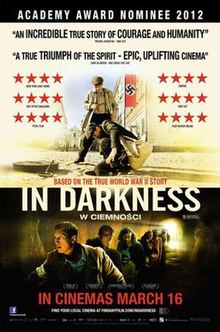In Darkness (2011 film)
| In Darkness | |
|---|---|

UK cinematic poster
|
|
| Directed by | Agnieszka Holland |
| Produced by | Andrzej Besztak Steffen Reuter Patrick Knippel Marc-Daniel Dichant Leander Carell Juliusz Machulski Paul Stephens Eric Jordan |
| Written by | David F. Shamoon (based on In the Sewers of Lvov by Robert Marshall) |
| Starring |
Robert Więckiewicz Benno Fürmann Maria Schrader Herbert Knaup |
| Music by | Antoni Komasa-Łazarkiewicz |
| Cinematography | Jolanta Dylewska |
| Edited by | Mike Czarnecki |
|
Production
company |
Zebra Films, Schmidtz Katze Filmkollektiv, the Film Works
|
| Distributed by | Sony Pictures Classics |
|
Release date
|
|
|
Running time
|
144 minutes |
| Country | Poland, Germany, Canada |
| Language | Polish, German, Yiddish, Ukrainian |
In Darkness (Polish: W ciemności) is a 2011 Polish drama film written by David F. Shamoon and directed by Agnieszka Holland. It was nominated for Best Foreign Language Film at the 84th Academy Awards.
Based on true events during German occupation of Poland, the film tells a story of Leopold Socha, a sewer worker in the then Polish city of Lwów (taken after World War II by the Soviet Union, and now part of Ukraine), who used his knowledge of the city's sewer system to shelter a group of Jews escaped from Lwów's ghetto during the German extermination of Jewish people.
In Darkness is a dramatization of a factual rescue of Jewish refugees during World War II in German-occupied Polish city Lwów (Lemberg in German, L'viv in Ukrainian). For over a year, a Polish Catholic sewer maintenance worker and burglar, Leopold Socha – along with his friend and coworker Szczepek Wróblewski – hid and cared for a group of hunted Polish Jews who had escaped the massacres and deportations during the liquidation of the Lwów Ghetto, at first helping them in exchange for daily payment, but then continuing to do so long after the Jews' money had run out and aiding them had become ever more dangerous.
The Jewish ghetto had been established in 1941, and the Nazis decided to liquidate it in June 1943. The Soviets took over Lwów city in July 1944, by which point Socha's small band made up approximately 10 of the less than 1,000 surviving Jews in the city. Socha's and Wróblewski's actions, and those of their wives, would earn them all recognition as Righteous Among the Nations recipients.
...
Wikipedia
